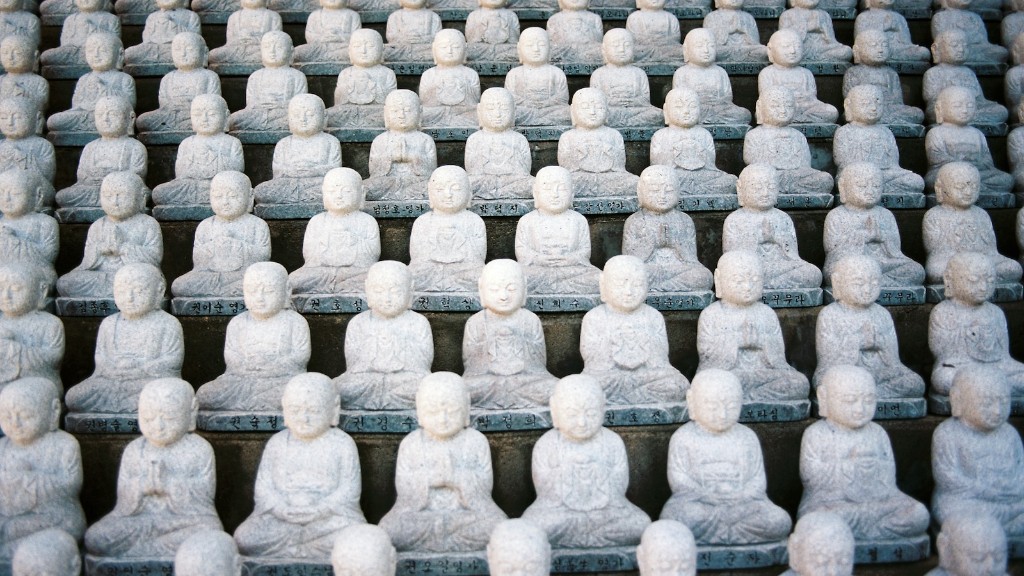Hinduism is a spiritual belief system with a wide range of interpretations and practices, many of which have an impact on ideas surrounding Heaven. According to the Vedas and Upanishads, Heaven is a place of joy and abundance that exists beyond the physical world and can be attained through devotion to Brahman (the ultimate force of the universe). Although there are many interpretations, the general consensus is that Heaven (or svarga) is a vivid, multilayered paradise that humans must strive to reach through a lifetime of spiritual practice. Those who reach Heaven experience a divine, blissful existence in constant communion with Brahman.
One common belief is that the divisions of Heaven are made up of higher and lower states. Those who have achieved a higher level of spirituality will ascend to a more sublime level, and their surroundings will be a manifestation of their spiritual development. Those who are lower on the spiritual ladder will find themselves in a more earthly paradise, but this will still be significantly better than their situation on Earth. This idea is supported by those who believe in rebirth, as they believe that Heaven is based on one’s karma, i.e. the consequences of one’s deeds in a previous life.
The Vedas also explain that Heaven is truly a realm of plenty. It is said to be a place of beauty, abundance, and contentment, where one’s wishes are all granted. The material luxuries that exist are plentiful, and those who take part in spiritual practices will find themselves rewarded with everlasting bliss and satisfaction, as well as riches and peace of mind. Some Hindu beliefs explain that Heaven is an illusion, and therefore not an actual physical place, but a mental and spiritual paradise. What this essentially means is that Heaven is a state of being, as opposed to a physical or material realm.
Interestingly, despite being a realm of plenty, Hindu beliefs suggest that Heaven is not necessarily positive for all. It is said that one must be worthy of entry and therefore those of lower spirituality could be subjected to life in the lower realms of Heaven (or Naraka). In this sense, Heaven is a double-edged sword and one must strive for spiritual purity and righteousness to ensure a favourable outcome.
Aside from the materialistic items found in Heaven, it is believed that the spiritual tools available to one in Heaven also contribute to its appeal. The Upanishads explain that in Heaven, one can find peace in prayer, song, and meditation. In addition, those who are not yet enlightened can take part in these spiritual practices in order to ascend to a higher plane of existence. All of this suggests that Heaven is truly a unique experience, as one is given access to the divine, and can learn how to be in harmony with Brahman.
The Nature of Heaven in Hinduism
In Hinduism, the true nature of Heaven is ambiguous yet alluring. As Hindus strive to reach Heaven, they gain an understanding of the essence of Heaven and the spiritual significance of such an environment. Although the exact layout of Heaven is unclear, many assume that religion, ethics, and spiritual practice are the cornerstones of the Lord’s domain. Heaven is often described as an ethereal paradise where the soul is reunited with God and surrounded by all the beauty and greatness of the universe. Heaven, in this sense, is a place of true bliss and enlightenment that is attainable by any sincere devotee of the divine.
The Karma of a Soul in Heaven
Many Hindu doctrines imply that what happens to the soul after death is somehow related to the karma, or deeds, of the person in their former life. This means that by practising virtue, one can ensure their chance for entrance into Heaven after death. On the other hand, if one has been living a life of evil or sin, then one may be relegated to a lower state of Heaven, or even a realm of suffering. The idea of karma as a link between a person’s former life and their death in Hinduism is often described as “the law of cause and effect”. This suggests that Heaven is ultimately a spiritual reward for those who live lives of good behaviour.
Heavenly System of Governance
In order to understand the workings of Heaven in Hinduism, it is necessary to understand the nature of the gods and goddesses that reign supreme in the high realms. In Hinduism, each of the gods and goddesses is said to have a function and purpose, and they tie into the higher realms of Heaven and the way it is governed. For instance, the Vedic texts talk about Indra as the king of Heaven and Vayu as the God of Wind, who both follow the wishes of Vishnu and Shiva, two of the most prominent gods in Hinduism.
These gods are said to dispense the rewards to those in Heaven as per their spiritual attainment. In other words, as long as one follows the rules laid out by the gods and goddesses, one can be sure to receive just rewards for their spiritual practises. This further underlines the importance of being a righteous person in life in order to attain peace and bliss in Heaven.
Heaven in Hinduism and Other Practices
The idea of Heaven in Hinduism differs significantly from popular views of Heaven in other spiritual practises. Unlike Christianity, in which Heaven is considered to be a literal location in the afterlife, Hinduism suggests that Heaven is more of a higher state of being, i.e. a mental and spiritual paradise that can be attained through devotion and righteousness. As such, one can reach Heaven via spiritual progress, as opposed to being granted an entrance after death.
Therefore, it is not uncommon to find Hindu beliefs that suggest that the route to Heaven is within reach in this very lifetime. This differs significantly from a Christian belief in an afterlife that is unrelated to the life one currently lives. To this end, Hindus believe that each of our decisions, deeds, and thoughts contribute to our spiritual welfare and can help guide us towards attaining Heaven in this lifetime.
Heaven and the Journey towards Enlightenment
It is important to remember that the true nature of Heaven in Hinduism is not meant to be taken literally, but is instead a metaphor for spiritual fulfilment and enlightenment. For many Hindus, reaching Heaven is the ultimate goal, and one that can only be achieved through a lifetime of spiritual practises and moral behaviour. In essence, Heaven is a location of superior spiritual attainment that is the result of dedicated spiritual progress. It is this progress, and the journey towards enlightenment, that Hindus strive for throughout their lives.
The Rewards of Heaven in Hinduism
As mentioned earlier, the rewards of Heaven are directly related to one’s karma. Those who strive to be virtuous and act in accordance with the divine will reap the benefits in their afterlife. In Hinduism, these rewards may take the form of divine knowledge, profound contentment, and a permanent connection to the divine. This is the ultimate goal for Hindus, and one that can be experienced in Heaven.
The Meaning of Heaven for Hindus
Ultimately, Heaven holds a special place in Hinduism as it implies ultimate spiritual union with Brahman. It is furthermore a reflection of the rewards one can obtain through a lifelong spiritual practice. To this end, Heaven has great meaning to Hindus, as it is a reminder of the importance of adhering to spiritual principles, as well as striving for a higher level of existence. By doing so, one can potentially reach a state of perfect bliss and contentment.
Tapping into the Unseen Potential of Heaven
Despite the seemingly otherworldly paradise that is imagined in Hinduism, Heaven is actually reachable for people who are willing to work hard for it. By embracing their spiritual journey and attaining a higher consciousness, Hindus can actually gain access to such an awe-inspiring realm. Even though it may seem impossible, the message is that Heaven is somewhere within our reach, and its power can be tapped into to bring us inner peace and joy.
Heaven as a Reflection of Our Inner State
Hindu beliefs also assert that Heaven is a reflection of one’s inner state. Those who are pure and virtuous will find themselves in a higher realm, while those who fail to adhere to ethical guidelines will find themselves on a lower plane. In essence, Heaven is a reflection of one’s karma and the progress they have made on their spiritual journey.
This notion highlights the importance of striving for greatness and adhering to spiritual principles to ensure a favourable outcome after death. By doing so, one can experience the bliss of Heaven and enjoy the rewards that come with it. These rewards may be physical, mental, or spiritual, but regardless, they are largely determined by one’s adherence to the divine.
The Attainability of Heaven
Finally, it is important to remember that Heaven, although seemingly unreachable and a distant dream, can actually be attained in this very lifetime. Through dedicated spiritual practice and moral behaviour, one can reach a level of spiritual perfection that will grant them entrance into the realm of bliss. This is truly an inspiring and noble goal, and if one commits to it, they can enjoy all the rewards of Heaven in this very lifetime.


